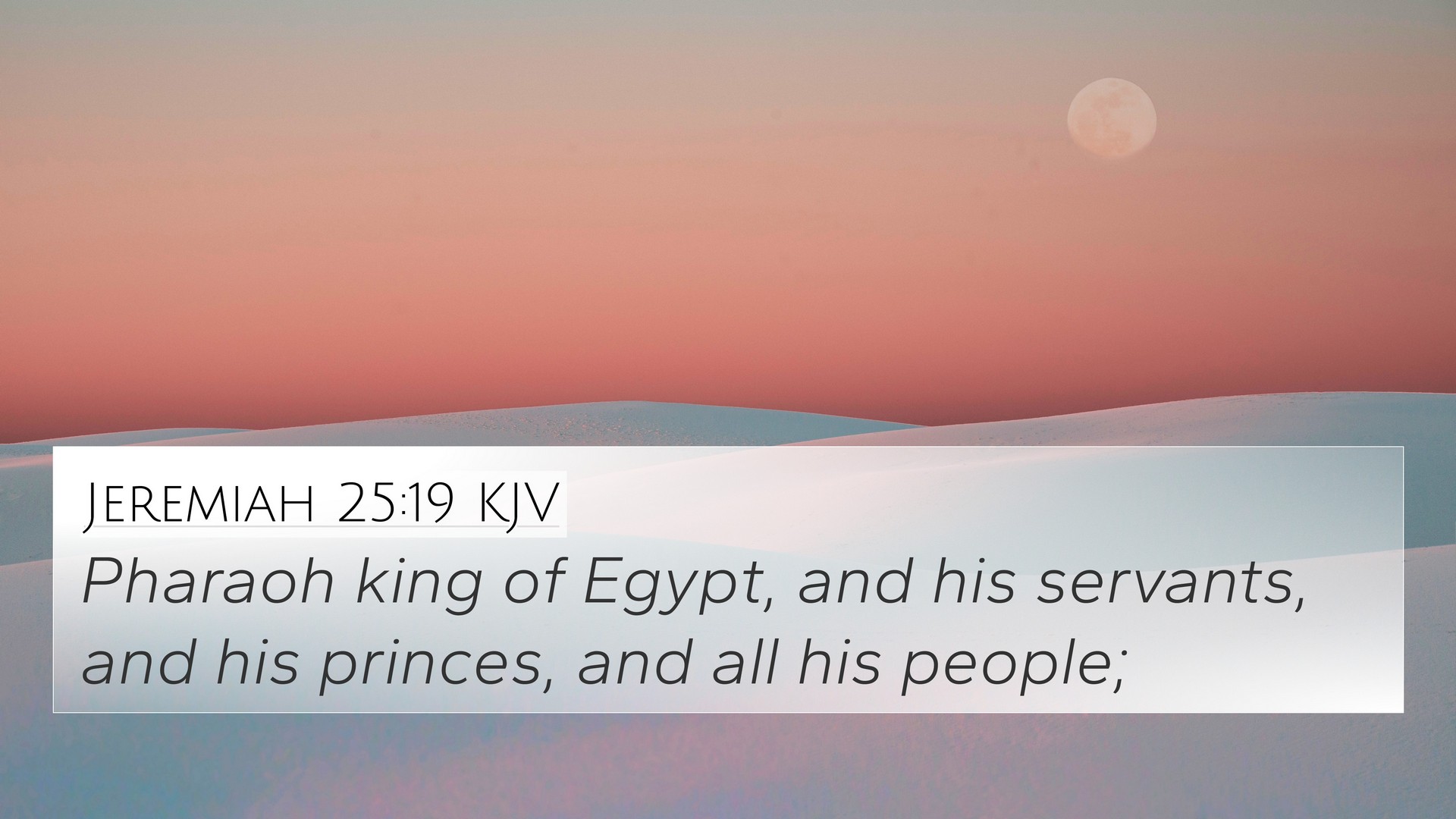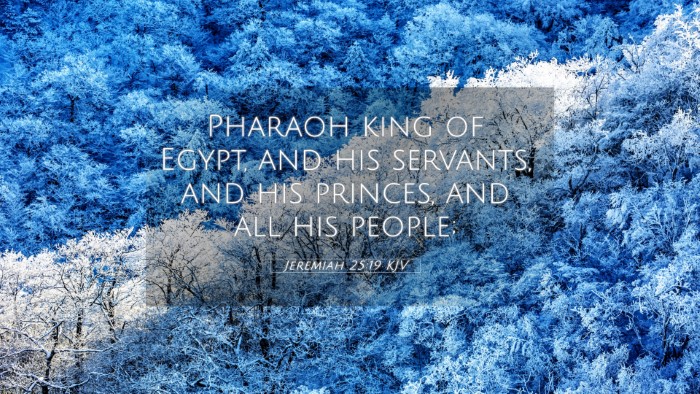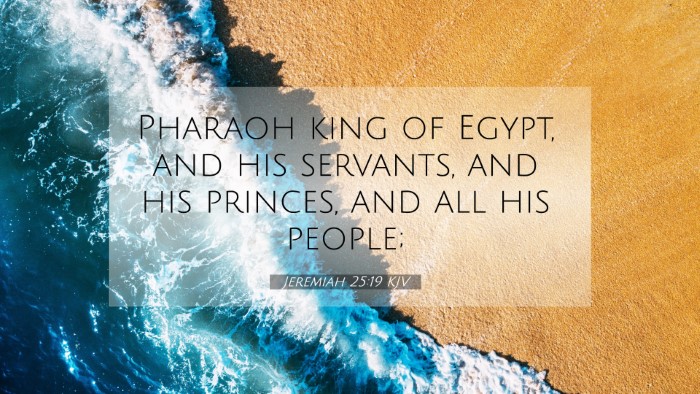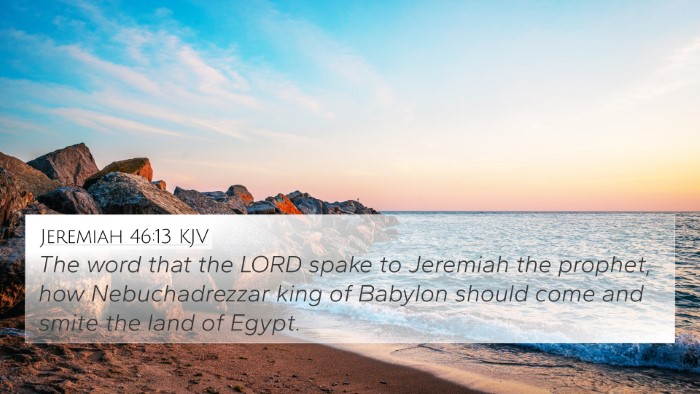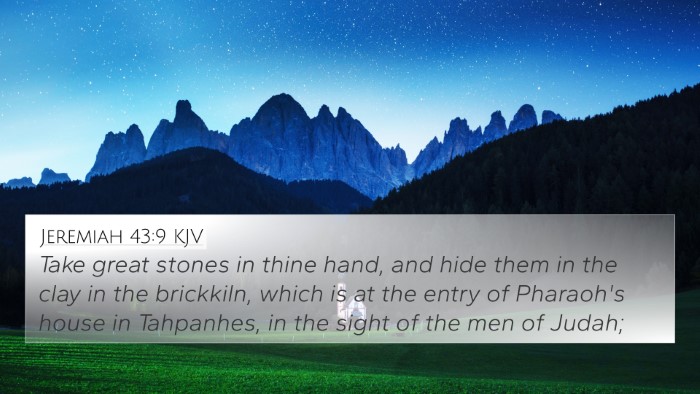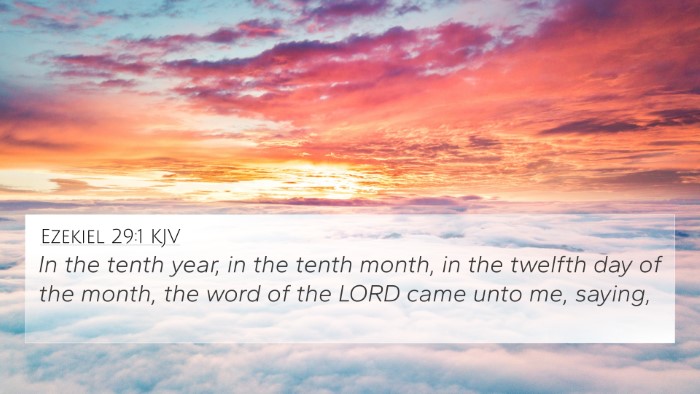Understanding Jeremiah 25:19
Jeremiah 25:19 is a profound verse that encapsulates the divine judgment against various nations that have strayed from God's commandments. This verse serves as a significant point for cross-referencing within the larger narrative of the Bible, revealing connections to themes of judgment, divine sovereignty, and the interrelation of prophetic messages across scriptures.
Verse Context
The context surrounding Jeremiah 25:19 is the prophet’s proclamation of impending judgment in the form of exile and destruction due to the nations’ disobedience. Jeremiah articulates the reach of God's judgment not just on Israel, but also on neighboring nations, emphasizing God's authority over all nations.
Verse Analysis
In this verse, we see God’s sovereignty as He declares the fate of nations. This assertion is essential because it conveys the idea that no nation is beyond the reach of God's will. The verse reads:
"And against Egypt, and against the kings of Egypt, and against the kings of the house of Pharaoh, and against all them that trust in him."
Here, Egypt symbolizes both a literal nation and an archetype of worldly power that often opposes God's plans. The commentary traditionally suggests that reliance on Egypt represents a greater issue of trusting human strength over divine providence.
Commentary Insights
-
Matthew Henry:
Henry emphasizes the comprehensive nature of God’s judgment. He notes that God is not merely concerned with Israel but also holds other nations accountable, showing that His justice is universal. Each king, particularly Pharaoh, represents the failings of reliance on earthly powers rather than on God.
-
Albert Barnes:
Barnes connects the judgment of Egypt with the larger narrative of the Exodus, reminding us that Egypt was the historical oppressor of Israel. He notes that this prophetic declaration serves as a reminder of God’s ability to deliver His chosen ones from oppressive forces, reinforcing the theme of redemption.
-
Adam Clarke:
Clarke points out that God's judgment upon Egypt signifies not just physical devastation but also spiritual consequences. It serves as a thematic connection to the prophetic literature, emphasizing the need for repentance and divine sovereignty over nations.
Key Cross-References
Jeremiah 25:19 can be linked to several significant Bible verses that deepen the understanding of its themes:
- Isaiah 19:1-4 - A prophecy concerning Egypt and its future judgment.
- Ezekiel 30:2-3 - A proclamation of destruction against Egypt for its idolatry.
- Exodus 14:30-31 - The defeat of Egypt during the Exodus, showcasing God’s power over nations.
- Revelation 18:2 - The future fall of Babylon, echoing themes of divine judgment against nations.
- Deuteronomy 28:58-61 - Warnings of curses upon those who disobey God's commands.
- Jeremiah 46:25-26 - Further elaboration of God's judgment on Egypt.
- Lamentations 3:34-36 - God does not overlook oppression or injustice, applicable to the judgments described.
Connections Between Bible Verses
This verse provides a crucial link to understanding how the Old Testament narratives connect with both prophetic writings and the New Testament reflections on judgment. Here are some thematic Bible verse connections:
-
Divine Authority: Cross-references such as Romans 13:1 where Paul discusses God establishing authority can be complemented by the judgments seen in Jeremiah.
-
Judgment and Repentance: Verses like 2 Chronicles 7:14 emphasize the importance of turning to God to avoid judgment, resonating with the message in Jeremiah.
-
The Nature of Trust: Proverbs 3:5-6 discusses trusting God over our understanding, linking back to the failures of those who trust in Egypt.
Conclusion
In conclusion, Jeremiah 25:19 serves not only as a prophetic warning but also as a profound reminder of God's sovereignty over all nations. The connections presented through various scripture show the consistency of God's message throughout the Bible. Understanding this verse through cross-references enriches our grasp of themes such as divine authority, judgment, and the unyielding call to trust in God alone.
